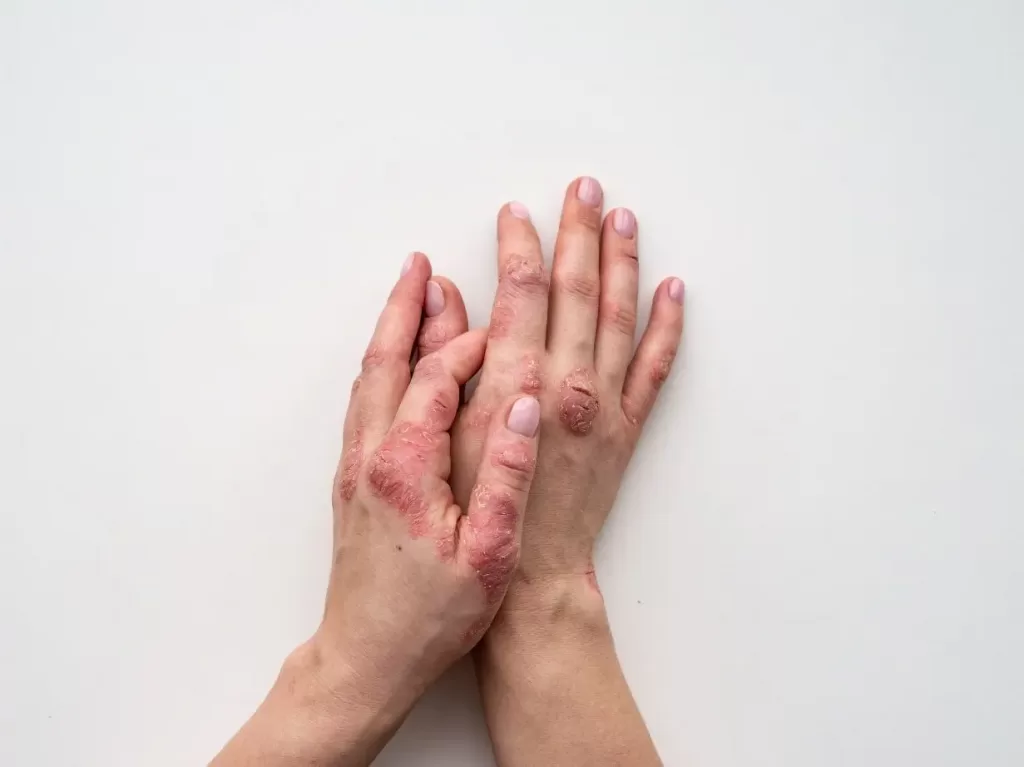Managing Psoriasis
Medically Reviewed by Dr Aifric Boylan
Last updated on 11.06.2024
What is Psoriasis?
Psoriasis is a chronic (long term) skin condition that causes areas of the skin to become thickened, red, and scaly (described as “plaques”). It affects men and women, across all ethnicities, occurring more commonly in adults than children. The peak ages of onset are 15-25 years and 50-60 years.
Psoriasis can fluctuate, flaring up and settling down over time. Though it does not have a permanent cure, treatments are available to help manage the symptoms and reduce the chance of flares.
What causes Psoriasis?
The cause of psoriasis is somewhat unclear, but involves an abnormal response of the immune system, resulting in excessive skin turnover and the formation of plaques. It has several subtypes and can affect different parts of the body. The commonest subtype, “chronic plaque psoriasis”, affects the elbows, knees, lower back and scalp.
Risk factors & Triggers
- Genetics – some people with psoriasis have a relative who also suffers from it, however psoriasis can also occur in people with no family history of the condition. It is thought that there are complex genetic factors leading to the presence of psoriasis in some people.
- Stress – stress can commonly trigger an exacerbation of psoriasis
- Smoking and alcohol – studies have shown that these can worsen psoriasis
- Weather – cold, dry weather tends to aggravate psoriasis, as already vulnerable skin becomes more prone to injury in dry conditions
- Medications – certain medications may trigger psoriasis, including lithium, beta blockers, non-steroidal anti-inflammatories (eg. Ibuprofen), and antimalarials
- Upper respiratory tract infection – there is a particular type of psoriasis (guttate psoriasis) that can emerge following an infection such as streptococcus (eg. Strep throat)
What are the symptoms of Psoriasis ?
- Red skin patches with a thick white/silvery scale
- Can be sparse large patches, or many small spots
- Often on the elbows, knees, lower back, torso, and scalp
- Plaques can be itchy and uncomfortable
- Can also cause nail and joint problems
- Flares can be upsetting and cause concern regarding abnormal skin appearance
Is Psoriasis contagious?
No, you cannot catch psoriasis by coming into contact with someone who has it. Psoriasis is not an infection on the skin, but is due to inflammation caused by the body’s immune system.
Does psoriasis only affect the skin?
Around half of people with skin psoriasis also develop nail problems, which can result in nails becoming discoloured, pitted, and prone to crumbling. Psoriasis can also manifest in a rare form of arthritis, which can cause joints to become red, swollen, and painful.
What is the treatment for Psoriasis?
General measures
General lifestyle measures and avoidance of triggers can help manage psoriasis and reduce the recurrence of flare ups. These include:
- Smoking cessation
- Alcohol reduction
- Reviewing with your doctor if any of your medications may be contributing to your psoriasis
- Stress management – ask your doctor for advice, if necessary.
Topical therapy
Mild psoriasis can be treated with one or a combination of the following applied to the affected skin areas, which may be prescribed by a GP:
- Corticosteroid creams (or lotion if on the scalp)
- Coal tar preparations
- Vitamin D type compounds
UV therapy
A special type of phototherapy (ultraviolet B light) can be used to treat more extensive psoriasis. This can be done in specialist centres.
Immunosuppressant medication
Certain medications that modify the immune system can reduces the skin’s inflammatory response and can be used for severe psoriasis that doesn’t respond to other treatments- these are used under specialist supervision.
Where can you get help?
- Your GP
- Dermatologist
- Psoriasis Australia – https://www.psoriasisaustralia.org.au
Article Resources
https://dermnetnz.org/topics/psoriasis/
https://www.mayoclinic.org/diseases-conditions/psoriasis/symptoms-causes/syc-20355840

Getting a Mental Health Care Plan in Australia: Your Guide
Getting a Mental Health Care Plan in Australia: Your Guide Mental health matters—and if you’re feeling overwhelmed, anxious, or down, a mental health care plan can help. But what is it, and how do [...]
UTI Symptoms and Treatment: What You Need to Know
UTI Symptoms and Treatment: What You Need to Know Urinary Tract Infections (UTIs) are common, uncomfortable, and often disruptive. But what exactly are the signs to watch for, and how can you get relief [...]
Free Mental Health Care Plan Online | Bulk-Billed by Qoctor
Free Mental Health Care Plan Online | Bulk-Billed by Qoctor Discover how to get a free, bulk-billed Mental Health Care Plan (MHCP) in Australia through Qoctor's telehealth service. Accessing [...]





